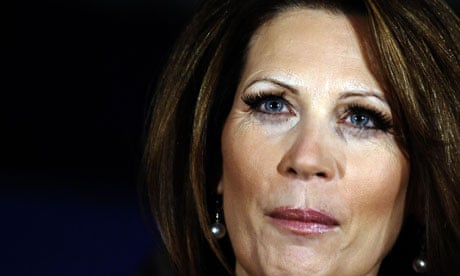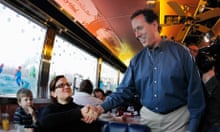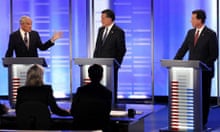As recently as the summer, it seemed possible that there could be two viable female candidates in the race for the Republican nomination. Amid the will-she-won't-she guessing game over whether Sarah Palin was going to throw her hat into the ring, Michele Bachmann made history by becoming the first woman to win the presidential straw poll in Ames, Iowa.
But then Palin demurred, and after a series of televised debates where she held her own as an outsider, Bachmann crashed and burned, winning only 6% of the votes in the Iowa caucuses. Her exit last week returns the race to business as usual, a battle fought once again between a group of wealthy, middle-aged white men in suits.
Bachmann's brief moment as a candidate has also left Republicans to wrestle with the question of why there aren't more female leaders in the party.
While analysts, pundits and players don't agree on one single answer, many feel there are additional stigmas and obstacles for conservative women considering a run for office. But in the wake of recent trailblazing by the likes of Palin and Bachmann, that could well change within the next couple of election cycles.
Congress remains a boys' club, with women holding 17 of the 100 seats in the Senate and 73 of the 435 in the House. Until last year there wasn't even a women's toilet near the House floor, according to the New York Times.
But between the parties, the division is even more stark. Of the women who serve, three out of every four is a Democrat. There are just five Republican women in the Senate and 24 in the House.
In 2010, fuelled by the success and visibility of Sarah Palin, that looked set to change, with an influx of Republican women running for public office, according to Bonnie Grabenhofer, political director and executive vice president of National Organisation for Women.
"There was a big anti-incumbent mood, and women were seen as outsiders," she said. "But they haven't had a lot of success."
Research has shown that women voters are more supportive of other women. But female voters also lean left, which Grabenhofer attributes to the Democratic party's more female-friendly agenda, which tends to be pro-choice and supportive of medicare and social security.
But it's possible Republican women also face greater barriers to entry into the political fray, says Teri Christoph, the co-founder and vice-president of Smart Girl Politics, an organisation for conservative women activists.
"In politics in general, women are under-represented," she told the Guardian. "But there is a cultural difference. They [Republicans] tend to be Christian, and Christians have more children. It's very hard to run for office if you have a large family."
Cristoph believes that Republican women are also judged more harshly by the media.
"You have to have a very strong backbone in being a conservative woman running for office. They are femininists, but they are pro-life and Christian, and that doesn't fit in with the media stereotype of what a woman should be," said Christoph.
Tammy Bruce, political commentator and radio talkshow host who worked on the Hillary Clinton presidential campaign before joining the Tea Party, believes that sexism exists in both parties. Democrats, she said, are better at hiding it.
"There are problems in big machines, and it is not just the Republican party. You just need to look at the way Hillary was treated. One of the popular t-shirts worn during the Obama campaign was 'Bros Before Hoes'," she said. "I got tired of the misogyny. All that horribleness of the campaign against Hillary."
Bruce, who describes herself on her website as as "gay, pro-choice, gun-owning, pro-death penalty Tea Party independent conservative", predicted a wave of congressional candidates in November who have "not been brought in by the machine."
Indeed, several observers believe that one of the unintended consequences of the Tea Party is that it will eventually provide the Republican party with future female leaders.
"If you look at the Tea Party movement, it is being run by more women than men," said Sabrina Schaeffer, executive director of the Independent Woman's Forum, an organisation aimed at building support for free markets, limiting government and promoting individual responsibility. "These women have to choose a party and I suspect it will ultimately be the Republican party."
Schaeffer said that there is a new breed of female "grassroots" campaigner – vounteers in their 30s and 40s knocking on doors for candidates – who are nearly ready to run for office themselves.
"They are women who have kids who are scared for their children's future. These are the 'mama grizzlies' who were not particularly political prior to 2008," she said. "They look at the spending the bailouts, and that is what motivates them. It may not be their time now; it might will take a few election cycles to shake it out; but there will be a few senators and congresswomen among them."
And just as Palin did, Bachmann may have just galvanised another wave of Republican women with her unprecedented straw poll victory.
"Michele Bachmann was the first woman Republican to win a straw poll caucus or primary. She made history," said Taylor Marsh, political analyst and author of The Hillary Effect, Politics Sexism and the Destiny of Loss.
"There are personal grudges against someone whose politics are extreme, and she also said a lot of things that were factually untrue, but it doesn't negate the fact that she was the person on the stage in those debates," adds Marsh.
"Sarah Palin had her problems too, but we should give women their due. I call myself a liberal and I really think Bachmann did something in this election."





Comments (…)
Sign in or create your Guardian account to join the discussion